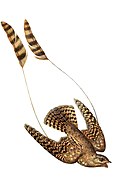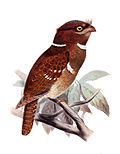| Tachornis | |
|---|---|
 | |
| Fork-tailed palm swift (Tachornis squamata) | |
| Scientific classification | |
| Kingdom: | Animalia |
| Phylum: | Chordata |
| Class: | Aves |
| Clade: | Strisores |
| Order: | Apodiformes |
| Family: | Apodidae |
| Tribe: | Apodini |
| Genus: | Tachornis Gosse, 1847 |
| Type species | |
| Tachornis phoenicobia [1] Gosse, 1847 | |
Tachornis is a genus of swift in the family Apodidae. It contains the following species:
- Pygmy palm swift (Tachornis furcata)
- Fork-tailed palm swift (Tachornis squamata)
- Antillean palm swift (Tachornis phoenicobia)
- Tachornis uranoceles (fossil; Late Pleistocene of Puerto Rico)
These birds are found in the Neotropics, ranging from the Caribbean to South America. They are characterized by their small size and deeply forked tails. [2]
The name Tachornis derives from the Greek words tachys or takhus, meaning "fast", and ornis, meaning "bird". [3] [4]





